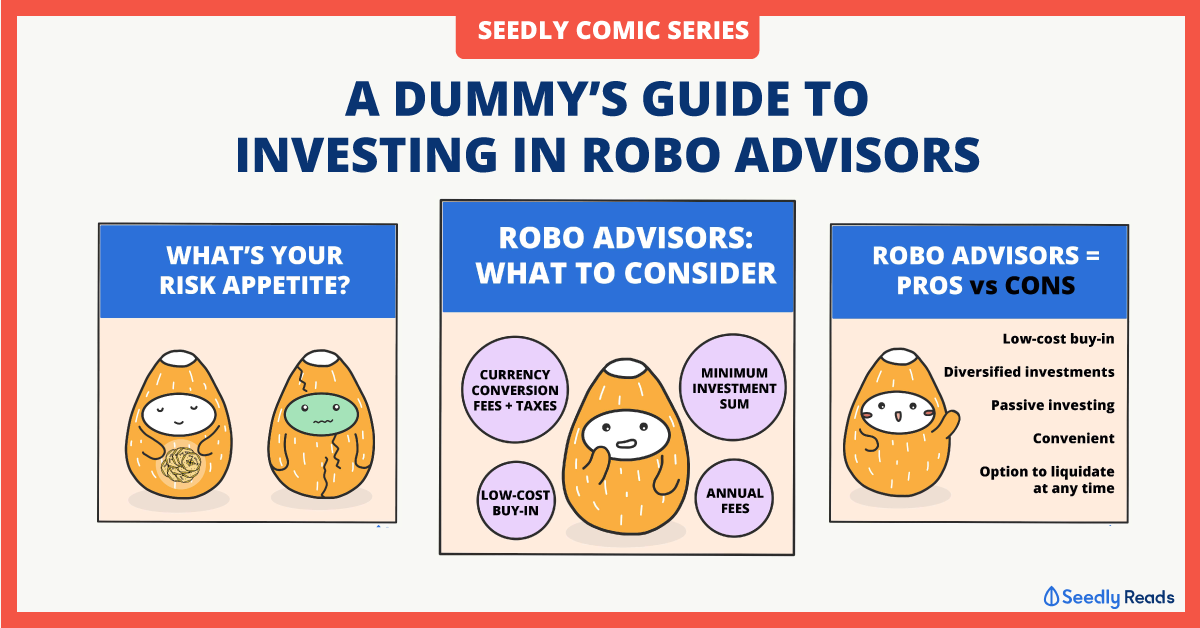Advertisement
Anonymous
How can we know when to get out of market if investing using robo-advisors? Thanks!
Using robo-investors to invest doesn't mean that I will be earning all the time. In situations when I'm earning and when I'm losing, how do I know when is the right time to readjust my portfolio?
4
Discussion (4)
Learn how to style your text
Amanda Ong
15 May 2019
Country Manager, Singapore at StashAway
Reply
Save
Sin Ting So
13 May 2019
Head Of Client Experience at Endowus
We think that it's very difficult to forecast the market or outguess other market participants, and it's time in the markets rather than timing the markets that will lead to long-term wealth accumulation.
Over time, markets display efficient characteristics and investors are rewarded commensurately for the risks that they take. This is why we believe in taking an evidence-based approach, where we analyze empirical data and time-tested academic evidence, and apply it in a systematic manner rather than trying to speculate or outguess other market participants. The aim of evidence-based investing is to give you the highest probability of success in growing your wealth over the long-term.
We wrote an article on market timing at Endowus Insights that you will hopefully find interesting!
Reply
Save
Kenneth Lou
08 May 2019
Co-founder at Seedly
Echoing what the panelists shared yesterday...
- Stay invested for the long run (even when it'...
Read 2 other comments with a Seedly account
You will also enjoy exclusive benefits and get access to members only features.
Sign up or login with an email here
Write your thoughts
Related Articles
Related Posts
Related Products

StashAway
4.7
1295 Reviews
StashAway Simple Guaranteed 3.55% p.a. (Guaranteed rate)
Cash Management
INSTRUMENTS
None
ANNUAL MANAGEMENT FEE
None
MINIMUM INVESTMENT
3.5%
EXPECTED ANNUAL RETURN
Mobile App
PLATFORMS

Endowus
4.7
658 Reviews

Syfe
4.6
934 Reviews
Related Posts
Advertisement










Hi there,
While it might seem tempting to pick your entry and exit points, especially when markets are volatile, research has shown that market timing can be detrimental to your long term investment performance.
As summarised by this article, almost all big stock market gains and drops are concentrated in just a few trading days each year. Missing only a few days can have a dramatic impact on returns.
For example, between 1994 and 2013, just missing the 20 best days of the S&P500 would have eroded 67% of your returns. As the best days and worst days of the market are equally concentrated, timing the market can be a perilous proposition, and may be detrimental to your long term returns.
Another academic study examined the probability that market timing can benefit investors' returns. Examining the Dow from 1900–2006 shows that "a few outliers have a massive impact on long-term performance. Missing the best 10 days resulted in portfolios 65% less valuable than a passive investment and avoiding the worst 10 days resulted in portfolios 206% more valuable than a passive investment. Given that 10 days represent 0.03% of the days in the sample, the odds against successful market timing are staggering."
A few more recent example can be seen here.
At StashAway, you don't have to worry about where markets are heading because we manage your portfolios for you.
ERAA and Re-optimisation
Instead of timing the market, StashAway’s Investment Framework, Economic Regime Asset Allocation (ERAA), automatically re-optimises your portfolio, reallocating assets when there are substantial changes in the economy, or when asset prices deviate substantially from their economic fair value.
By investing in assets which are undervalued and more likely to outperform in current economic conditions, we provide your portfolio with exposure to strong upsides. In addition, by reducing allocations into assets which are unsuitable for a particular economic regime, or are overvalued, StashAway’s portfolios can manage your portfolio risk actively, protecting your portfolio.
If our investment team sees a fundamental change in economic conditions, we will re-optimize your portfolios for you. What these means is that, for example, if the economy were to go from “good times” to a “recession”, we will recommend a re-optimization that will reduce equity exposure and concentrate it in protective sectors (e.g., consumer staples), and increase allocations to asset classes such as government bonds, particularly for long maturity dates and gold. Our investment framework (ERAA) is risk-centric: the goal is to maintain your risk exposure constant across market and economic cycles while optimizing returns.
Hope this helps! :)